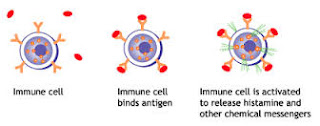The
number of people who now say they are gluten free is definitely on the rise.
But are people sticking to a gluten free diet simply because it has become the
latest health fad, or do they simply feel better without gluten in their
diet?
Unless
you are diagnosed with one of the gluten related conditions which include celiac
disease, non-celiac gluten sensitivity and wheat allergy it is not necessary to
consume a gluten free diet and it may even be harmful to you.
Wheat
or gluten in the diet is often blamed as the cause of a variety of unpleasant
symptoms. Common complaints include abdominal pain, diarrhoea, bloating and
excessive wind, as well as lethargy, poor concentration and general aches and
pains. Feeling better when wheat or gluten is removed from the diet does not
necessarily mean the person has celiac disease or any of the related
conditions. A doctor needs to be consulted to investigate all potential causes
for these symptoms.
If
you feel better when you do not eat gluten you may suffer from one of the gluten
related diseases. It is estimated that up to 80% of people with celiac disease
are not diagnosed yet. It is
advisable that you see your doctor to ascertain if you have one of the diseases
discussed. REFER TO THE CELIAC CHECKLIST. It is critical for your long term health to be properly diagnosed.
Do not go on a gluten free
diet until you have consulted a doctor because it may affect the results.
A
recent survey from the NPD Group, a market research firm which tracks eating
trends reported that 11% of U.S. households follow a gluten free diet, but only
25% of those living in a gluten free home indicate that celiac disease or
gluten sensitivity is the reason for the gluten free diet.
There
also seems to be a common misconception that a gluten free diet is healthier or
that it promotes weight loss. In fact the reverse may be true. Gluten free
products may in fact be higher in calories than their non-gluten counterparts,
especially baked goods. There is also the risk of developing nutrient
deficiency if you omit gluten from your diet. If you go on a gluten free diet
it is essential you do so knowing all the nutritional facts associated with it.
It
is true that people are abandoning bread and gluten in droves. But wheat has
been one of the most important crops for centuries, and wheat has been a staple
part of our diet for thousands of years. So why is it now seen as such a toxic
substance and so threatening to our health?
Is
it because wheat available today has been genetically engineered and developed
properties unlike its ancient predecessor? As a population are we simply eating
too much gluten in the form of additional additives which bakers add to bread
to get the chewy texture we so love? Is it the increased use of refined flours?
Or is it the move away from fermentation of bread to the commercial mechanical mixing
of dough which alters the gluten structure? Or is it because it is just a
passing fad?
Or
is it even the gluten which is causing these symptoms in individuals who have
not been diagnosed with celiac disease or non-celiac gluten sensitivity?
An
Australian researcher into gluten sensitivity, Peter Gibson, of Melbourne's Monash University said that
their study has shown that, in people with gut symptoms who have had
some relief with the gluten free diet, it is not the gluten that is the
culprit, but it is more likely to be FODMAPs'
The
study conducted by Gibson suggested that short-chain carbohydrates called
FODMAPs (Fermentable Oligo-saccharides, Disaccharides, Mono-saccharides
and Polyols) might be the factor leading to the symptoms such as
bloating and gut distress and not the gluten as commonly thought. According to
Gibson, people mistakenly believe they are gluten sensitive, because they felt
better for avoiding wheat, but in actual fact that is because wheat has a high
percentage of FODMAPs and it is avoiding the FODMAPs which is making them feel
better.
Why gluten has been blamed is that people do often
improve with a gluten free diet because wheat, rye and barley, the three
cereals that contain gluten, all have high amounts of FODMAPs in them. Unfortunately,
wheat has been recognised as containing gluten and, with the media hype and
film stars etc. pushing gluten-free, it is quite understandable that people
think it is the gluten that was the villain. Wheat contains more than just
gluten.
iF YOU DO NEED A GLUTEN FREE DIET CHECK OUT THESE TOP 10 TIPS TO FIND OUT HOW TO DO IT SUCCESSFULLY.










